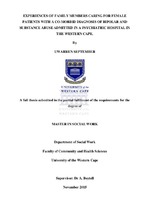| dc.description.abstract | Caregivers of people with psychiatric illnesses experience challenges, which contribute significantly to their burden of care and can result in health and mental health problems. The researcher was interested in the lived experiences of caregivers, which resulted in the following research questions: What are the lived experiences of caregivers caring for a co-morbid bi-polar and substance-abuse patient, and what context and situations contribute to the problems? The goal of this research was to explore the experiences of family members caring for relatives admitted in a psychiatric hospital, and the contexts in which these occurred. The objectives were to explore and describe the lived experiences of family members caring for a relative with a co-morbid diagnosis of bi-polar and substance abuse, as well as the situations or contexts in which these experiences occur. These objectives were followed by the last objective of the research, which was to make recommendations to the multi-disciplinary teams (MDTs) on services for family members caring for such a relative. A qualitative, phenomenological research approach was used for this study with explorative and descriptive research designs. The population for the study comprised families in the Western Cape caring for female relatives admitted to a psychiatric hospital with co-morbid bipolar and substance use disorder. The researcher purposively selected relatives of female in-patients admitted in a female admission ward. Families were chosen whose members were admitted for more than three months. In-depth phenomenological interviews were done with six participants until data saturation was reached. Phenomenological data analysis, focusing on the textural (lived experience) and structural (context in which it was experienced), were followed after data collection. Findings comprised a composite description of the phenomena of both textural and structural description. The findings of this research resulted in conclusions and recommendations for MDTs and social work on interventions for family members caring for a family member with this mental condition.
Findings from this study conclude what was found in the literature regarding challenges in the system leads to caregivers feeling burdened with their mentally ill relative, and that resources and support are lacking in communities. This led to recommendations aiming at MDTs, government and social workers working in institutions, to align with community social workers in order to strengthen working relationships with the aim of providing the necessary support services to families caring for mentally ill relatives. Future research suggestions are also aimed at supporting families caring for patients with a mental illness for which reasons for re-admissions will be assessed and evaluated. | en_US |

